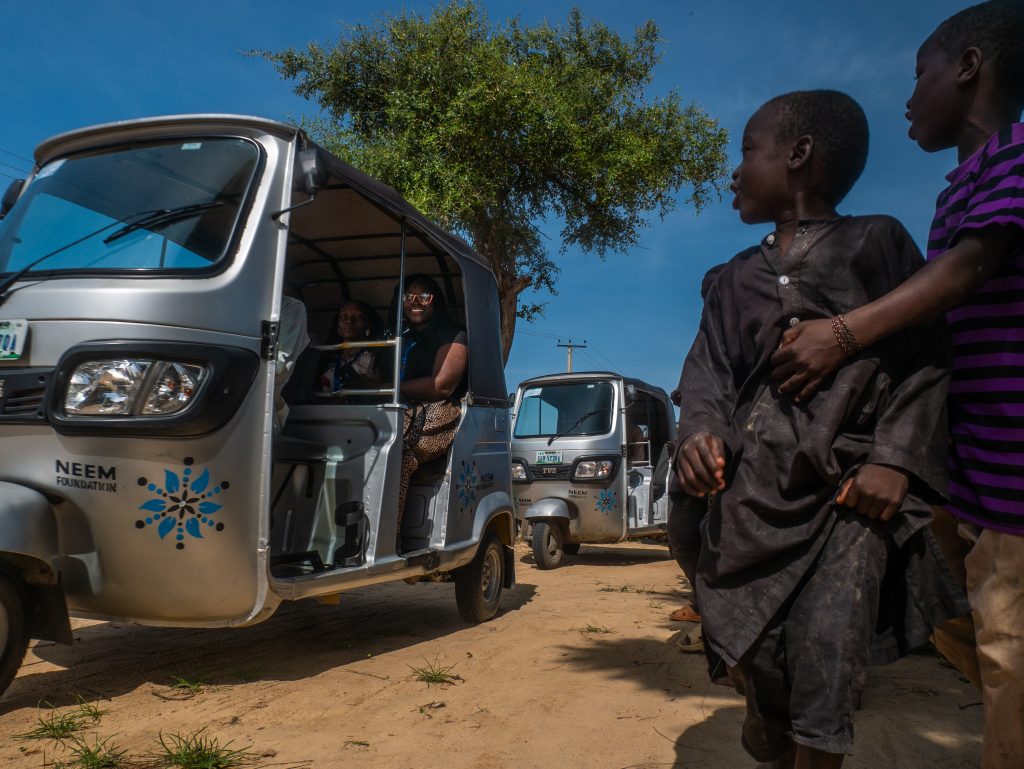Counselling on Wheels, generously funded by the Kingdom of the Netherlands, has since 2017, provided services to over 23,000 survivors across over 50 communities in Maiduguri Municipal Council, Jere and Konduga Local Government Areas in Borno State. Offering a safe space for survivors to express their conflict-induced mental health challenges has had tremendous results, reflected in the pre and post assessments carried out with psychometric tools that assess posttraumatic stress disorder (PTSD), depression, anxiety, stress and vulnerability to violent extremism. One lasting legacy the team is very proud of is the Community Mental Health Support Groups we constitute and leave behind in the communities. These sustainable Support Groups are a clear reflection of our deep-seated desire to not just heal but to equip brothers, sisters, mothers and fathers with the tools to heal themselves.
Project activities
The mobile counselling units aim to expand access to trauma care by taking mental health services to the ‘door-steps’ of formerly under-served communities, especially poor rural dwelling women/girls and children that are victims of psychological trauma occasioned by the Boko Haram insurgency. The key objective is to increase access mental health services. This has become essential considering the lack of existing government infrastructure to support the rehabilitation of people affected by the insurgency. The unique experiences of women/girls who are survivors of rape or abduction call for utmost confidentiality and the necessity of providing counselling services in locations where the victims feel a sense of safety.
In addition to general PSS provision and counselling, our experience in developing and implementing extensive, multi-disciplinary rehabilitation programmes has provided us with useful insight into the effectiveness of creative pursuits as part of a comprehensive approach to psychosocial support especially for women and children associated with armed groups. Neem Foundation has identified this group as an especially vulnerable category of people who without the right support could pose a threat to the security and wellbeing of communities. Creative arts and activities such as crafts, painting, reading and drama can all contribute to successful therapeutic interventions. Not only can these activities directly address psychological trauma, they also serve to challenge the radical ideology of extremist groups, enhance resilience and promote a greater sense of community and national identity. Neem Foundation plans to host group sessions that incorporate these activities, bringing together women and children in a safe and easily accessible environment for shared growth and self expression. The Art and Play therapy would for example help beneficiaries to express their anger and thoughts, and channel it in a positive way. This therapeutic approach would also helps beneficiaries to reduce tendencies of violence against others, and improve their level of tolerance.
In order to enhance re-integration and rehabilitation activities currently ongoing in Borno State, Neem Foundation hosts monthly peace meetings within communities as well as capacity building workshops as part of a community- wide rehabilitation process so that community members can take ownership for defining the type of post-conflict society they want to build. These monthly engagements and meetings give Neem Foundation an opportunity to train key community stakeholders on peace building and conflict mitigation methods. Stakeholders will include Bulamas (District Heads), women leaders, religious leaders, security services and other credible key influencers.
Neem Foundation trained stakeholders into Community Peace-building Committees so as to sustain peace building efforts. This is considered crucial because it will support the process of re-integration, reconciliation and conflict mitigation, currently being implemented by the State Government as well as International and national Non-Governmental organizations (NGOs). Neem Foundation began the set-up of these peace committees after all stakeholders involved have received training.
Neem Foundation produced a short-film on the Counselling on Wheels project as well as a series of short-clips with positive messages from key community influencers. Neem Foundation has also produced and disseminated booklets and flyers educating individuals on how to manage conflicts at the community level and psychological symptoms, such as coping techniques (e.g., relaxation exercises) and self-care. The objective is to use these sensitisation and messaging campaigns to amplify the activities of the community-based peace committees.

